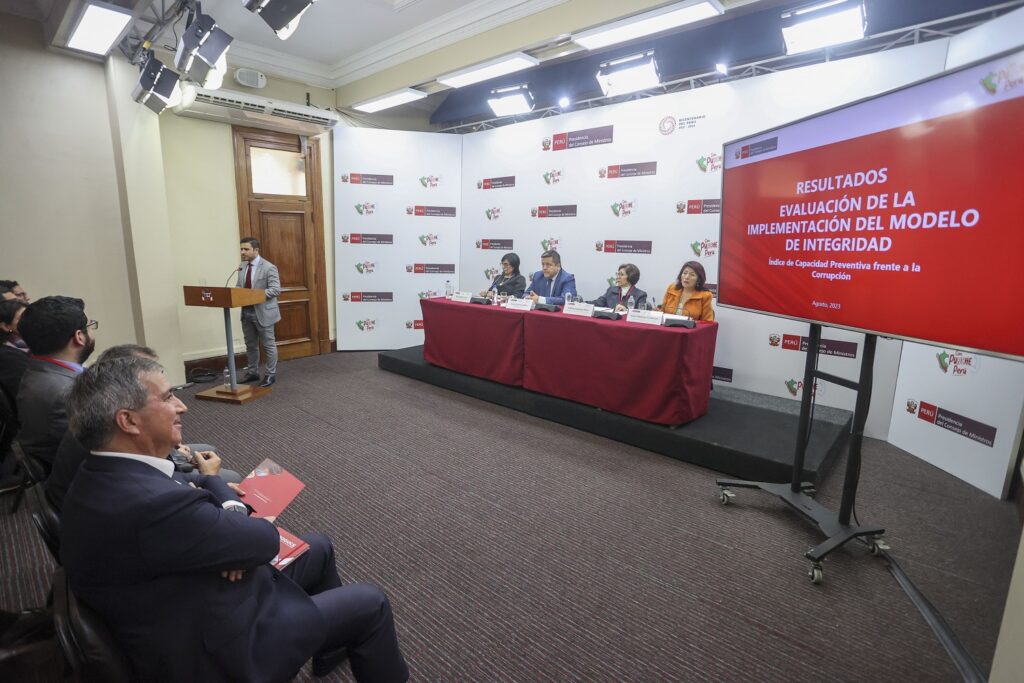Agencia Peruana de Noticias PRENSAPERU.PE https://prensaperu.pe/ Twitter: @prensaperupe La Presidencia del Consejo de Ministros (PCM), a través de la Secretaría de Integridad Pública, presentó los resultados del avance realizado en 189 entidades del Estado que implementan el Modelo de Integridad, a fin de reducir la vulnerabilidad de las instituciones públicas frente a la corrupción.
En ese marco, se destacó que 152 entidades del Poder Ejecutivo han avanzado hasta la segunda etapa de implementación del Modelo de Integridad, con un promedio del Índice de Capacidad Preventiva frente a la Corrupción (ICP) acumulado de 1.19.
De otro lado, nueve organismos constitucionalmente autónomos, se ubicaron dentro de la primera etapa de implementación, con un ICP promedio de 0.87. Por su parte, los 25 gobiernos regionales, se mantuvieron en la primera etapa de implementación, con un ICP promedio de 0.34; mientras que dos entidades del Poder Judicial alcanzaron un ICP promedio de 0.75; y el Poder Legislativo obtuvo un puntaje de ICP de 0.04.
Entre los resultados presentados, se advirtió que las entidades reportaron un mayor avance en los componentes de denuncia y transparencia. También se informó que 53% de las entidades evaluadas no acreditaron acciones de identificación, evaluación y tratamiento de riesgos de corrupción o inconducta funcional. En el caso de los gobiernos regionales este porcentaje alcanzaría al 84%.
Respecto a las entidades que mostraron mejores resultados en el primer semestre del año 2023, destacan los ministerios de la Producción y de Energía y Minas, el Gobierno Regional de Cusco y la Junta Nacional de Justicia, los cuales tuvieron un mejor desempeño en las primeras etapas de la evaluación.
Para la evaluación se aplicó el ICP, herramienta que permite verificar la implementación de las distintas etapas del modelo, el cual se organiza alrededor de nueve componentes: compromiso de alta dirección, gestión de riesgos, políticas de integridad, transparencia, control, denuncia, comunicación y capacitación, supervisión y monitoreo, y designación del oficial de integridad.
La presentación de los resultados contó con la presencia de los ministros de la Producción, Raúl Pérez-Reyes, y de Comercio Exterior y Turismo, Carlos Mathews; de la presidenta de la Comisión de Alto Nivel Anticorrupción y presidenta de la Junta Nacional de Justicia, Imelda Tumialán; de la Gobernadora Regional de Lima, Rosa Vásquez (en representación de la Asamblea Nacional de Gobiernos Regionales), del secretario General de la PCM, Óscar Gómez, entre otros representantes de entidades públicas.
DATOS
Para acceder al reporte completo dar clic a este link
https://cdn.www.gob.pe/uploads/document/file/5039639/Informe%20ICP%20medio%20t%C3%A9rmino%202023.pdf?v=1692901842
El ICP es la herramienta que permite medir el avance en la implementación del Modelo de Integridad, lo cual se efectúa de manera progresiva y por etapas. En función del avance alcanzado por la entidad pública dentro de la exigencia de cada etapa, se asigna una puntuación de 0 a 1; donde 0 supone que no se ha verificado ningún avance y 1 que se ha cumplido plenamente en la etapa evaluada.
Fuente: Agencia Peruana de Noticias PRENSAPERU.PE https://prensaperu.pe/ Twitter: @prensaperupe

English translation
PCM presents results of the implementation of the Integrity Model in 189 public entities during the first semester of 2023.
Peruvian News Agency PRENSAPERU.PE https://prensaperu.pe/ Twitter: @prensaperupe The Presidency of the Council of Ministers (PCM), through the Secretary of Public Integrity, presented the results of the progress made in 189 State entities that implement the Integrity Model, in order to reduce the vulnerability of public institutions to corruption.
Within this framework, it was highlighted that 152 entities of the Executive Branch have advanced to the second stage of implementation of the Integrity Model, with an average accumulated Index of Preventive Capacity against Corruption (ICP) of 1.19.
On the other hand, nine constitutionally autonomous organizations were located within the first stage of implementation, with an average ICP of 0.87. For their part, the 25 regional governments remained in the first stage of implementation, with an average ICP of 0.34; while two entities of the Judiciary reached an average ICP of 0.75; and the Legislative Branch obtained an ICP score of 0.04.
Among the results presented, it was noted that the entities reported greater progress in the reporting and transparency components. It was also reported that 53% of the evaluated entities did not accredit actions for the identification, evaluation and treatment of risks of corruption or functional misconduct. In the case of regional governments, this percentage would reach 84%.
Regarding the entities that showed better results in the first semester of 2023, the Ministries of Production and of Energy and Mines, the Regional Government of Cusco and the National Board of Justice stand out, which had a better performance in the early stages. of the evaluation.
For the evaluation, the ICP was applied, a tool that allows verifying the implementation of the different stages of the model, which is organized around nine components: senior management commitment, risk management, integrity policies, transparency, control, reporting, communication and training, supervision and monitoring, and designation of the integrity officer.
The presentation of the results was attended by the Ministers of Production, Raúl Pérez-Reyes, and of Foreign Trade and Tourism, Carlos Mathews; the president of the High Level Anti-Corruption Commission and president of the National Justice Board, Imelda Tumialán; the Regional Governor of Lima, Rosa Vásquez (representing the National Assembly of Regional Governments), the General Secretary of the PCM, Óscar Gómez, among other representatives of public entities.
DATA
To access the full report, click on this link.
https://cdn.www.gob.pe/uploads/document/file/5039639/Informe%20ICP%20medio%20t%C3%A9rmino%202023.pdf?v=1692901842
The ICP is the tool that allows measuring progress in the implementation of the Integrity Model, which is carried out progressively and in stages. Depending on the progress achieved by the public entity within the requirement of each stage, a score from 0 to 1 is assigned; where 0 means that no progress has been verified and 1 that it has been fully accomplished in the evaluated stage.
Source: Peruvian News Agency PRENSAPERU.PE https://prensaperu.pe/ Twitter: @prensaperupe
